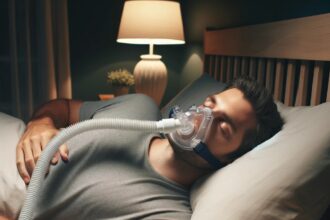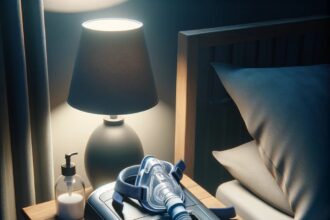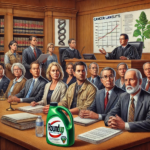Continuous Positive Airway Pressure (CPAP) therapy is a widely used treatment for obstructive sleep apnea, a condition where breathing repeatedly stops and starts during sleep.
For many, CPAP therapy significantly improves sleep quality and overall health. However, one common side effect that users often experience is a sore nose. This discomfort can be frustrating and discouraging, making it challenging to adhere to the therapy consistently. Understanding the causes and solutions for a sore nose from CPAP can help patients continue their sleep apnea treatment, without unnecessary discomfort.
CPAP users experiencing a sore nose may feel disheartened, as this pain can interfere with their sleep and daily life. Fortunately, there are ways to alleviate this discomfort and enhance the CPAP experience. Mass Tort America specializes in helping patients navigate the challenges of medical treatments and can offer guidance and support for those dealing with any CPAP sore nose-related issues. We are dedicated to ensuring that patients receive the care they need without suffering from preventable side effects.
Common Causes Of A Sore Nose From CPAP
One of the primary reasons for a sore nose from CPAP use is the mask. CPAP masks come in various shapes and sizes, including nasal masks, full face masks, and hybrid mask masks, each potentially contributing to discomfort. And an ill-fitting mask can cause nose bridge sores, red marks, and general CPAP mask discomfort, especially if the mask is too tight or if there are air leaks. Dry nose and nasal passage dryness, often due to insufficient humidification, can also result from CPAP masks.The material of the mask, especially if it’s too tight, can also contribute to discomfort. Finding a properly fitting mask that fits well without causing excessive pressure is crucial for minimizing nasal soreness. Different mask styles and sizes offered by CPAP suppliers can help find the right fit, and heated tubing can further enhance comfort by delivering pressured air at a consistent temperature.
Another common cause is nasal dryness. The constant airflow from the CPAP machine can dry out the nasal passages, leading to irritation and soreness. This dryness nose irritation can be exacerbated by too much pressure or if the machine does not have a built-in humidifier or if the humidifier settings are not appropriately adjusted. Nasal dryness can also lead to congestion, further complicating the use of CPAP therapy. Using a heated humidifier and humidified CPAP therapy can help alleviate nasal passage dryness and prevent sore throat and dry mouth.
Allergies or sensitivities to the nasal, mask type, materials or the air pressure can also cause a sore nose. Some users may have reactions to the silicone or other materials used in CPAP masks. Additionally, the pressure settings on the machine might be too high for some users, causing undue strain on the nasal passages.
Preventive Measures And Solutions
Ensuring a proper mask fit is one of the most effective ways to prevent a sore nose. CPAP masks should be snug but not overly tight for preventing nose sores. Users can try different style mask options, such as nasal pillow masks, nasal masks, or full face masks, to find one that provides comfort without causing pressure nose sores afterwards. Many CPAP suppliers offer fitting sessions to help users find the most suitable mask.
Using a heated humidifier along with the CPAP machine can significantly reduce nasal dryness. Heated humidifiers add moisture to the air, preventing the nasal passages from drying out. Adjusting the heated humidifier settings to an optimal level can help maintain comfort throughout the night. For those who do not have a built-in humidifier, external humidifiers are available and can be used in conjunction with the CPAP machine.
For those with allergies or sensitivities, choosing masks heated tubing made from hypoallergenic materials can alleviate symptoms. Additionally, regular cleaning of the CPAP mask and tubing can prevent buildup of dust and allergens. If the pressure settings on new mask are too high, consulting with a healthcare provider to adjust the machine to a more comfortable level is advisable.
Understanding The Role Of Humidification In CPAP Therapy
Humidification plays a crucial role in CPAP therapy, especially for users experiencing nasal discomfort. CPAP machines often come with a built-in humidifier that adds moisture to the air being delivered. This moisture helps prevent the drying out of nasal passages, which is a common cause of irritation and soreness. Adjusting the humidifier settings to match the user’s needs can greatly enhance comfort during therapy.
For users without a built-in humidifier, external humidifiers are available and can be connected to the CPAP machine. These devices offer various settings to control the level of humidity, allowing users to find the perfect balance. Proper use of a humidifier can alleviate nasal dryness and reduce the risk of developing sores, making CPAP therapy more tolerable and effective.
It’s also essential to regularly clean and maintain the humidifier to prevent mold and bacteria buildup. Keeping the humidifier clean ensures that the air being inhaled remains pure and safe, further reducing the risk of nasal irritation and other respiratory issues.
Choosing The Right CPAP Mask For Comfort
Selecting the right CPAP mask is vital for ensuring comfort and preventing a sore nose. Masks come in different styles, including nasal masks, nasal pillows, and more traditional full face masks full-face masks, each catering to different preferences and needs. A properly fitting mask should create a good seal without causing excessive pressure on the nose dry mouth or face.
Nasal masks cover the nose and are suitable for users who prefer a minimalist design. Nasal pillows fit directly nasal pillow mask and into the nostrils and are ideal for those who feel claustrophobic with larger masks. Full-face masks cover both the bridge of your nose and mouth, providing a secure fit for users who breathe through their mouths during sleep. Trying different masks to find the best fit can significantly enhance comfort and adherence to CPAP therapy.
In addition to fit, the material of the mask can also impact comfort. Masks made from hypoallergenic materials can help users who have sensitive skin or allergies. Many top CPAP equipment and suppliers offer trial periods for masks, allowing users to test different options before committing to a particular mask style. This flexibility ensures that users find a mask that meets their comfort needs and reduces the likelihood of developing a sore nose.
Nose Care And Maintenance For CPAP Users
Proper nose care can prevent the development of nose sores and other issues related to CPAP therapy. Using nasal lubricants or gels can help keep the nasal passages moist and reduce irritation caused by the pressurized air. These nasal lubricant products are especially useful for users experiencing nasal passage dryness.
Regularly cleaning the CPAP mask cushion and equipment with mild soap and water can prevent skin irritation and the buildup of dirt and oils that can cause facial sores. Dirty cushions can exacerbate skin sensitivity and lead to discomfort. It’s also important to inspect the mask cushion regularly and replace it as needed to ensure a proper fit and prevent air leaks.
Incorporating mask liners can provide an additional layer of protection between the skin and the mask, reducing the risk of red marks and skin irritation. Mask liners can also help absorb facial oils, keeping the mask clean and improving comfort during use. For those with severe sensitivity, trying different various mask liner styles or using a hybrid or mask liner, can also help find the most comfortable option.
Is CPAP Therapy Right for You?
For many individuals, CPAP therapy is a lifesaver, significantly improving sleep quality and overall health. However, the discomfort associated with a face mask and a sore nose can make adherence difficult. It is important to weigh the benefits of the therapy against the discomfort and to explore all available solutions to enhance comfort.
Understanding the various causes of a sore nose and implementing preventive measures can greatly improve the amount CPAP therapy patients experience. By taking proactive steps and seeking professional guidance when necessary, users can continue to benefit from CPAP therapy without unnecessary pain.
Why Choose Mass Tort America For CPAP-Related Legal Issues?
At Mass Tort America, we understand the complexities and challenges that come with medical treatments like CPAP therapy. If you believe your sore throat, nose or other complications from CPAP use may be due to a defective product or improper guidance from your healthcare provider, our legal team is here to help. We offer comprehensive legal support to ensure that you receive the justice and compensation you deserve for any harm suffered.
Mass Tort America is dedicated to protecting the rights of patients nationwide. Our experienced attorneys are adept at handling medical-related legal issues and can provide expert guidance through every step of the legal process. Contact us today at 800-356-4338 or through our contact form at https://masstortamerica.com/contact/ to learn more about how we can support you in your medical journey.



















